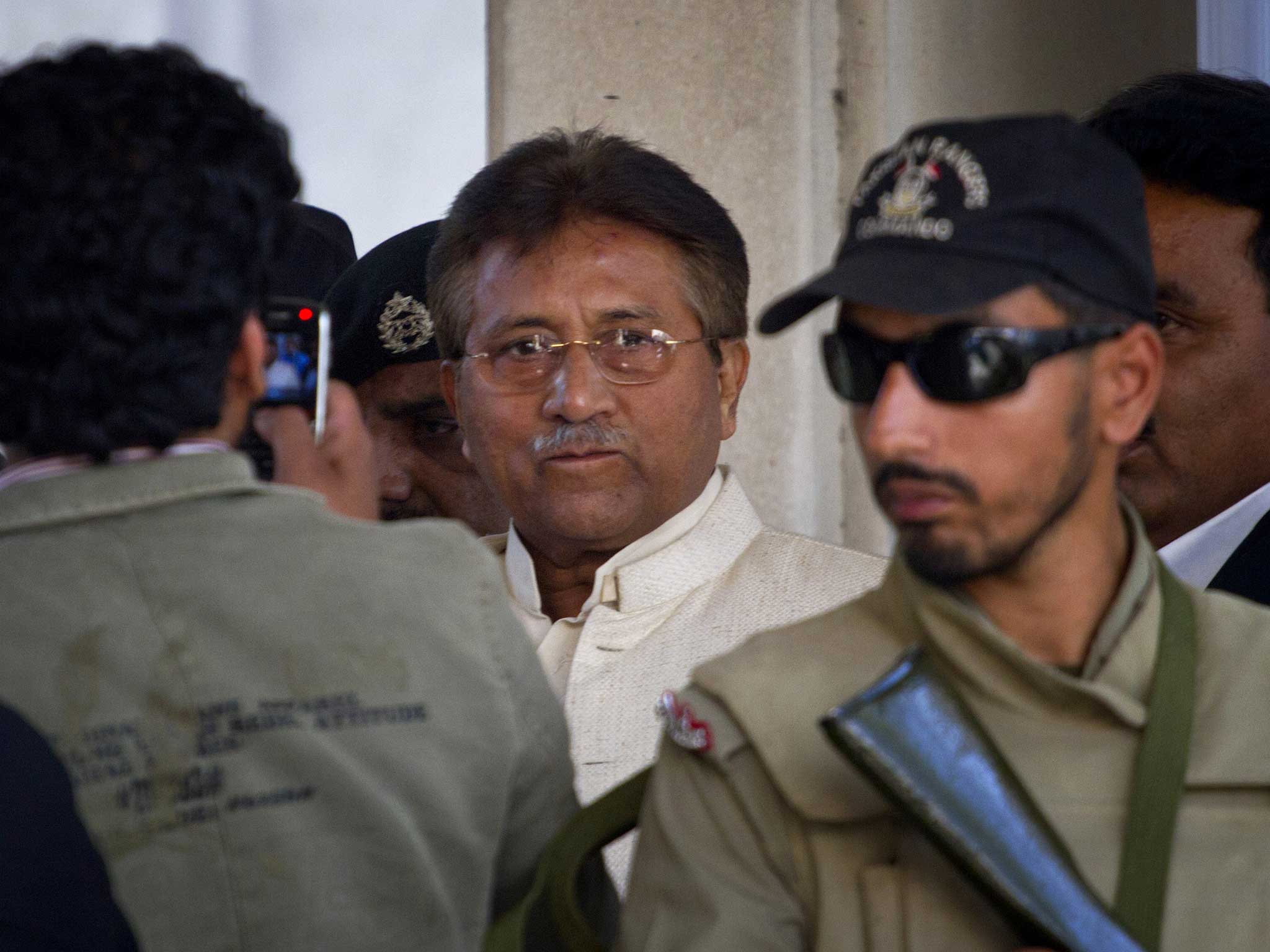Pakistan's former military leader Pervez Musharraf flees court as it orders his arrest
Before officials could act, the former commando was hurried away by his security team and sped off in a black SUV

Your support helps us to tell the story
From reproductive rights to climate change to Big Tech, The Independent is on the ground when the story is developing. Whether it's investigating the financials of Elon Musk's pro-Trump PAC or producing our latest documentary, 'The A Word', which shines a light on the American women fighting for reproductive rights, we know how important it is to parse out the facts from the messaging.
At such a critical moment in US history, we need reporters on the ground. Your donation allows us to keep sending journalists to speak to both sides of the story.
The Independent is trusted by Americans across the entire political spectrum. And unlike many other quality news outlets, we choose not to lock Americans out of our reporting and analysis with paywalls. We believe quality journalism should be available to everyone, paid for by those who can afford it.
Your support makes all the difference.He returned saying he would save Pakistan. He ended fighting to save himself.
Pakistan’s former military leader Pervez Musharraf was last night facing ignominy and disgrace having fled from an Islamabad court that had ordered his arrest. Some reports suggested that the farmhouse to which he fled could be declared a “sub-jail”.
Earlier in the day, in scenes that bordered on farce, judges at the Islamabad High Court ordered that bail he had been granted by another court should be revoked and that police should take him into custody. But before they could act, the former commando was hurried away by his security team and he sped off in a black SUV.
After leaving the court, the 69-year-old Mr Musharraf made his way to his farmhouse at Chak Shazhad, an upscale neighbourhood outside of Pakistan capital. The Mediterranean-style property complete with a running track and a swimming pool was built with retirement in mind in 2008. Mr Musharaff's lawyer told reporters the former president was inside enjoying a cigar.
But late on Thursday, it emerged that the country's caretaker government had announced its support for the court's decision and the Express Tribune newspaper reported Mr Musharraf's farmhouse was to be declared a sub-jail.
Mr Musharraf's lawyers said they will appeal to the supreme court on Friday to challenge the lower's court's decision. They tried to do so on Thursday, but ran out of time.
Thursday's development was the latest humiliating twist in Mr Musharraf's faltering attempt to restart his political career since he returned to Pakistan last month after almost four years of exile in Dubai and London. It raised further questions about his judgement in deciding to return to the country.
Earlier this week, an election tribunal ruled that his attempt to contest the Chitral constituency seat - three other seats he had applied to contest had already been rejected - was invalid. He was hoping to appeal to the supreme court but few expected he would succeed.
But even on Thursday night, Mr Musharraf continued to press his case. In a video message recorded at his farmhouse, he said: “Why I am being stopped form pursuing politics in Pakistan. Is it because I brought progress to Pakistan and added to its security?”
Despite the slim nature of his support on the ground, Mr Musharraf has never lacked for bluster or self-belief. When he returned to Karachi on March 24 on a flight from Dubai, a journey he made despite death threats from the Taliban, he declared he had come to “save Pakistan”.
Experts said Mr Musharraf's plight could create fresh problems for his former comrades in the military. “The army leadership will be involved in it. They cannot get away from it. They were involved in the decisions he took,” said Talat Masood, a former general.
Mr Masood said the army's current leadership was among those who urged Mr Musharraf not to return to Pakistan. “I doubt very much the army will interfere. It will create fresh problems,” he added. “It is difficult for the army to defend Musharraf at this time.”
In a statement posted on Mr Musharraf's social media page, a spokesperson, Dr Raza Bokhari, claimed the former president had been escorted back to his home by security guards “in the face of specific and credible physical threats to his life by the enemies of Pakistan”.
“We expect this unwarranted judicial activism, motivated by personal vendettas since his return to Pakistan to participate in the upcoming elections, will cease and the supreme court, without prejudice, will immediately grant necessary relief following precedence and the rule of law,” added the spokesperson.
The case over which he faces arrest relates to allegations that he committed treason when when he sacked up to 60 judges, among them senior figures including the chief justice Iftikhar Chaudhry, and declared emergency rule as he struggled to hold on to the reins of power in November 2007.
He also faces a series of other legal challenges relating to his alleged role on the killing of former prime minister Benazir Bhutto and provincial leader Nawab Akbar Bugti. He has denied all the allegations.
While the return of Mr Musharraf has sparked interest among the media, especially the international press, analysts said Mr Musharraf had little support in Pakistan and that his return appeared drive largely by his ego. Voters are due to go to the polls in a general election on May 11.
Join our commenting forum
Join thought-provoking conversations, follow other Independent readers and see their replies
Comments